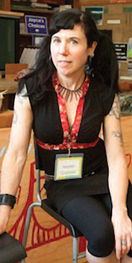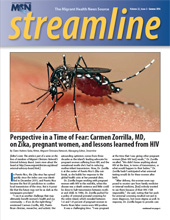Consultas Naturistas: An Overview of Practice at an Integrative Free Clinic
 By Michelle Steinberg, M.S. (Clinical Nutritionist and Herbalist)
By Michelle Steinberg, M.S. (Clinical Nutritionist and Herbalist)
[Editor’s note: What exactly is integrative medicine? The Academic Consortium for Integrative Medicine and Health says that integrative medicine “reaffirms the importance of the relationship between practitioner and patient, focuses on the whole person, is informed by evidence, and makes use of all appropriate therapeutic and lifestyle approaches, health care professionals and disciplines to achieve optimal health and healing.” Michelle Steinberg, MS, is the founder and main practitioner of the Consultas Naturistas program at Street Level Health Project in Oakland, California. She has a Master’s degree in Human Nutrition and has completed a three-year training program in Clinical Herbalism; her Bachelor’s degree is in Cultural Anthropology. Here, Ms. Steinberg shows how health centers can incorporate aspects of integrative medicine into their primary care model.]
As public awareness about complementary treatment options grows, practitioners in a variety of modalities, from herbalism to acupuncture to chiropractic, have sprung up around the country, with a particular prevalence in the San Francisco Bay Area where I currently reside. The importance of integrating these therapies with allopathic medicine is steadily becoming more recognized, with nutrition at the forefront as providers and patients alike accept the impact of food upon wellness. Yet many of these holistic practices, which ironically often come from a diversity of cultures, are less available in underserved migrant communities due to common barriers to care including cost, location, and language. This is a critical moment to shift our health care paradigm, as integrative medicine (IM) is potentially one of the most successful ways to meet the Triple Aim of improving the health of our populations, improving patient experience, and reducing costs. IM is a multifaceted approach in which primary care providers collaborate with a diversity of practitioners to coordinate care to address the whole-body needs of a patient. By offering culturally responsive individualized care, it can improve patient satisfaction, while potentially inexpensive preventative treatments can reduce cost and improve health outcomes. Patients also benefit from the interaction with and between multiple practitioners, with all of us working together across modalities to arrive at the most effective treatment plan.
CONSULTAS NATURISTAS: INTEGRATIVE MEDICINE IN PRACTICE
Consultas Naturistas (translated roughly as “Natural Medicine Consultations”), the nutrition and herbal medicine program at Street Level Health Project (www.streetlevelhealth.org) in Oakland, CA provides free, Spanish/English bilingual, integrative health care to low income individuals. These services are available twice weekly during regular clinic hours, both as one-on-one visits with the practitioner and as a wellness group that takes place in the waiting room as patients gather to see the doctor. Street Level Health Project (SLHP) primarily serves day laborers and other uninsured/underinsured, low- or no-income Latino/a immigrants. Other communities commonly accessing services include Mongolian, Nepalese, Eritrean, and many more. Since beginning in 2009, the Consultas Naturistas program has treated approximately 550 clients, with 30 percent seen on multiple follow-up visits. Visits last 45 minutes per person and involve a patient-centered discussion of health history and lifestyle, focused on nutrition, exercise, and sleep habits. Clients receive free tinctures and teas that I custom-blend for the patient, as well as vitamins and supplements. I also collaborate with our Promotora de Salud (Community Health Worker) who brings nutrition information directly to day laborers in the streets, and our cook who makes nutritious free community meals. SLHP’s medical director is onsite three days per week to provide treatment. A second physician and a nurse practitioner are also on staff. Our psychologist offers mental health counseling, and health navigators direct clients to outside service providers for ongoing primary or specialized care. Other core programs include free lunches and food bags, and a workers’ collective. SLHP is a unique environment where many of the social determinants of health are addressed simultaneously under one roof through interprofessional collaboration – a critical component of integrative medicine. Though SLHP is not a Federally Qualified Health Center, I believe this model could be adopted by FQHCs to develop similar interprofessional collaborations within or outside of their health centers.
NUTRITION IN A NUTSHELL
Nutrition is an important aspect of integrative health. The majority of Consultas visits, even those for conditions that might not appear directly related to diet, involve some discussion of nutrition. When meeting with Consultas clients, my focus is on:
- Whole, minimally processed foods;
- Increased intake of non-starchy vegetables;
- Macronutrient balance in all meals and snacks, with an emphasis on lean protein and healthy fats;
- Increased water intake.
Most clients are immigrants or migrant workers for whom the standard American diet was not always standard. The conversation usually begins with the individual listing how her/his diet changed upon arriving inthe US. More often than not, the client elaborates a pattern where the components above were distinctly present in her/his diet prior to moving to the US and declined upon arrival, a common result of migration resulting from changes in food access and financial means, and acculturation. This realization leads to the awareness that one’s ancestors held keys to nutrition that can be healing in the present. As I am not from the same cultural background as the majority of my clients, this strategy allows me to encourage the knowledge that my clients already possess. The message then becomes that necessary nutritional changes can feel familiar rather than alienating, which undoubtedly leads to a higher rate of success.
FLEXIBILITY
Flexibility is crucial at Consultas, as many clients have very specific circumstances that require practical remedies. The main point isto be ready to empathetically meet people wherever they are and have mechanisms in place to accommodate their needs, another way to focus on the whole person.
- For homeless clients, herbs must be portable, easily stored, and require a minimal amount of preparation; think tinctures, powders, and capsules over teas (though one homeless client loved tea and would religiously get a cup of hot water from the closest McDonald’s before bed).
- When clients are battling alcohol addiction or the resulting physical damage, alcohol-based tinctures are generally not an option, and teas and powders become the focus.
INDIVIDUALIZED PROTOCOLS
Engaging individuals in a holistic context means that there is no universal formula for a given ailment. A constitutional and multi-variable picture of each person is part of formulating an effective treatment plan that addresses the whole patient rather than just the sum of her/his most prominent symptoms. Sadly, this approach is relatively rare in the conventional medical paradigm. Creating space for the individual is a cornerstone of Consultas Naturistas that is somewhat unique. The opportunity to be engaged in a respectful, non-rushed, interactive manner around one’s overall well-being may be of as much value to many clients as the herbs and supplements themselves.
BUILDING A MOVEMENT FOR ACCESSIBLE INTEGRATIVE CARE
I have the privilege of serving on the board of an organization called Integrative Medicine for the Underserved. Our focus is supporting a growing number of practitioners from a variety of modalities who strive to bring integrative care to communities with limited access, often in the setting of FQHCs. We offer an annual summer conference where presenters from a diversity of modalities share practical tools to enhance patients’ well-being. This year’s conference will take place from August 18th to 20th in Irvine, California and our theme is “Collaborate to Create Healthy Communities,” with the goal of increasing collaboration among those who foster wellness at all levels. In addition to other exciting presenters, the Institute for Functional Medicine will be partnering with us to offer a pre-conference workshop and conference track. Conference details and registration are available on our website, along with a free toolkit with numerous resources, from patient handouts to curriculum for medical residents. We are also working on a broader level to expand the dialogue on integrative health care and to create policy change. We encourage clinicians of all backgrounds to join us in this movement to shift the paradigm of medical care to focus on wellness, at both individual and community levels!
FOR MORE INFORMATION
Integrative Medicine for the Underserved offers a handbook, toolkits, and many other resources, in addition to its annual conference: www.im4us.org
The National Center for Integrative Primary Healthcare is a collaboration between the University of Arizona Center for Integrative Medicine (AzCIM), the Academic Consortium for Integrative Medicine & Health (The Consortium), and the Health Resources and Services Administration (HRSA): https://nciph.org
The NIH’s National Center for Complementary and Integrative Health is the federal government’s agency for scientific research on the diverse medical and health care systems, practices, and products that are not generally considered part of conventional medicine: https://nccih.nih.gov/about
An earlier version of this article incorrectly translated "Consultas Naturistas" as "Naturopath Consultations." The online version has been corrected.
Read this article in the Summer 2016 issue of Streamline here!
Sign up for our eNewsletter to receive bimonthly news from MCN, including announcements of the next Streamline.
Return to the Streamline Summer 2016 Table of Contents.
